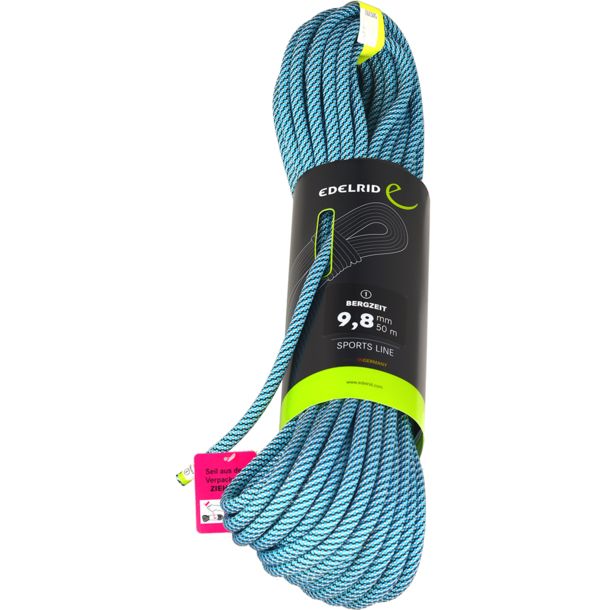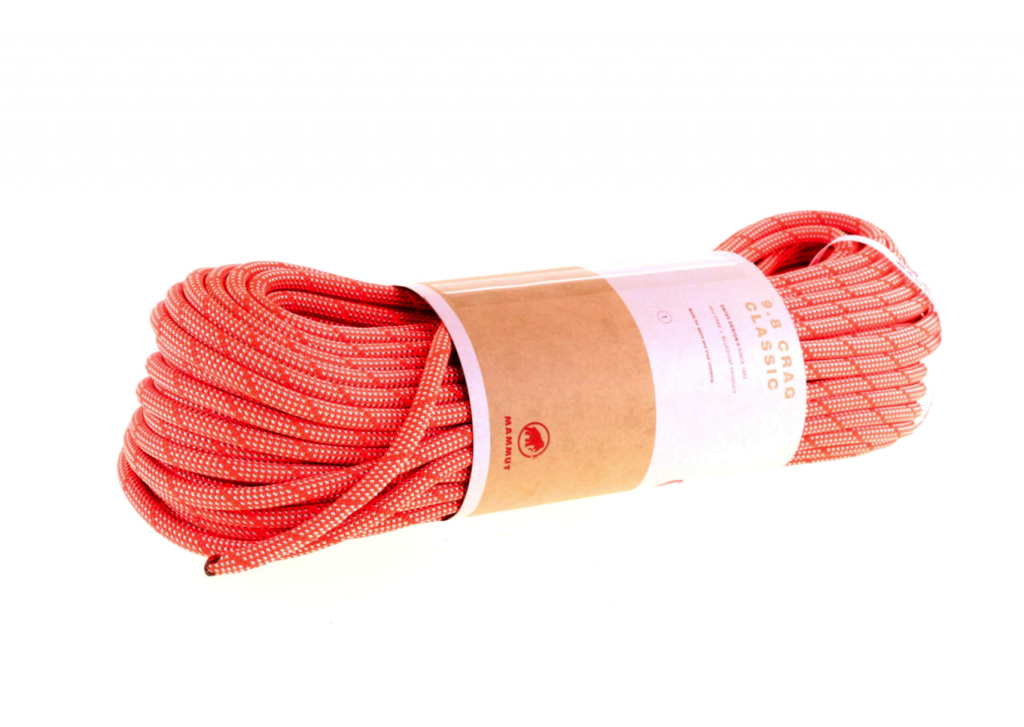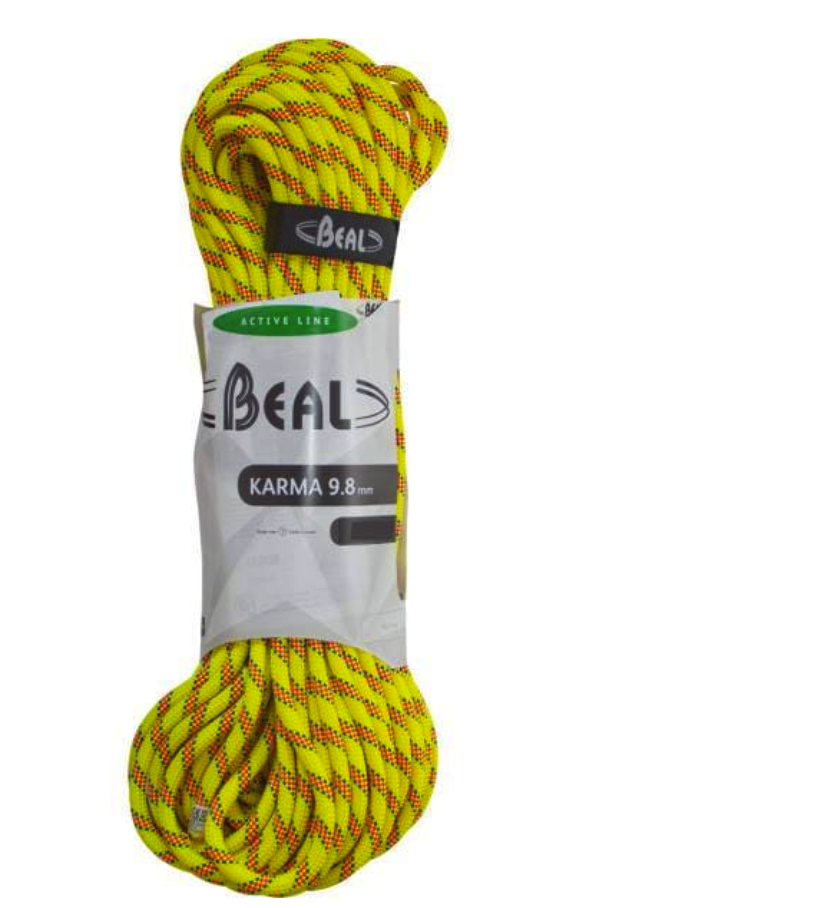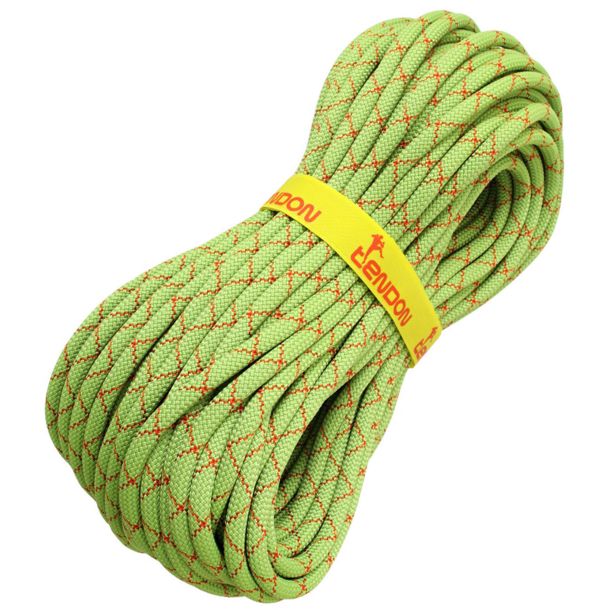Table of Contents
Single rope, double rope, indoor rope – which one? Our buying guide provides the necessary perspective before the next rope purchase. Plus: 4 inexpensive climbing ropes in test
What you will find In this article:
- 4 cheap climbing ropes reviewed:
- Beal Karma
- Edelrid Boa
- Mammut 9.8 Crag Classic
- Tendon Smart Lite.
- Climbing ropes indoor & outdoor at a glance (table): Overview of current climbing ropes: Table with product data
- Buying advice: Which rope do I need? Single rope, half rope and double rope explained
- Why an indoor rope?
- This is how climbing ropes are constructed + Proper rope care
- Why climbing ropes break
4 cheap climbing ropes reviewed
The majority of ropes sold today are used for outdoor and indoor sport climbing. The standard rope for rock climbing is a single rope with a diameter between 9 and 10 millimeters. For climbing at the absolute limit, climbers like to reach for a thinner and lighter rope that runs through the belay chain with minimal friction. Thicker ropes, on the other hand, have higher safety reserves and longer durability. We have tested four inexpensive sport climbing ropes in the price segment from 125 to 160 euros for you in practice. The price refers to a length of 70 meters, which is the standard length for outdoor sports climbing today. The low prices are achieved by the manufacturers by waiving the so-called equipment, for example, an impregnation against water absorption. As long as these ropes are used normally in a dry environment and preferably with a rope bag, there is no need for such equipment. However, impregnation also serves as protection against dirt and in this respect contributes to a longer service life of the rope.
Suitable for projecting
The 9.8 mm class offers a good compromise between handling and durability. Especially heavier climbers will wear such ropes noticeably slower than very thin single ropes during extreme sport climbing and projecting with many small falls and frequent hanging on the piton. Regardless of the diameter, however, the goals of best handling and high durability are fundamentally somewhat contradictory. A softer rope is easier to clip, “swallows” more crane and is generally better to handle. A rope with a harder sheath is achieved through higher sheath yarn tension. This is good for durability, but results in a stiffer rope that is more prone to craning. In addition to sheath hardness, sheath percentage is also important for durability. The higher the better, is the simple rule of thumb.
In our test field, the Edelrid Boa has the highest sheath percentage at 40 percent, while the Smart Lite from Tendon has the tightest sheath and is correspondingly the stiffest rope. Otherwise, the four ropes do not give each other too much in the standard values. All hold at least 7 standard falls. Beal’s Kharma has the lowest impact force, which is good for the faller and the belayers. However, its dynamic elongation is correspondingly the highest, so you fly a little further. The static elongation of the four candidates is between 6.3 (Tendon) and 9.3 percent (Edelrid). It is important, for example, when top-roping, when the climber sits down in the rope while still near the ground. Then a rope that stretches less is more favorable.
Good ropes do not have to be expensive
The ropes presented are all well suited for normal sport climbing on the rock or in the hall. In terms of handling, the ropes from Beal, Edelrid and Mammut are very similar. All three are pleasantly soft, easy to clip and have a similarly rough sheath. Beal and Edelrid deliver their ropes in clever packaging that eliminates the awkward initial uncoiling: pull from the package into the rope bag, and the ropes can be used immediately without craning. Tendon’s Smart Lite is the least expensive rope, but it’s also a bit stiffer than the others and also the shortest rope in the test field. Its harder sheath bodes well for durability and softens a bit with use, but it still doesn’t quite match the others in terms of handling and crane performance.
Beal Karma
Easy to unpack thanks to the “Magic Pack” and pleasantly soft to handle: the Karma cuts a good figure right from the start. It convinces with low impact force and weight per meter, but also has a lower sheath percentage of 34 percent than the ropes from Mammut and Edelrid. At 4.46 kg*, the rope was the lightest in the test field, and we measured a length of almost exactly 71 meters. The medium-rough rope knots well and clips very easily. When it comes to the environment, Beal is committed to 100 percent recyclability. Additionally, Beal promises to plant a tree for every rope sold. The rope comes with washing instructions. The small plastic sleeve with the standard specifications at the end of the rope unfortunately slips quickly from the rope.
Conclusion: Good handling and low weight characterize the Karma from Beal.
Technical data Beal Karma:
Standard falls: 7
Weight per meter: 61 g
Impact force: 7.5 kN
stat. Elongation: 8
dynamic elongation: 36
sheath percentage: 34
Equipment: Magic Pack, center marking
Price (70 meters): 136,42 €

Edelrid Boa
Like all ropes from Edelrid, the Boa is Bluesign certified. Edelrid’s 3D Lap Coil ensures that the rope is immediately ready for use and crane-free on the rope bag after being pulled out of the package. The Boa is similarly soft and pleasant to handle as the Karma from Beal. However, it has a significantly higher sheath content, which is good for durability. Our specimen weighed 4.59 kilograms, little more than the Karma, but was also the longest of the test ropes, measuring just under 72 meters. The dynamic elongation is low, the catch impact correspondingly somewhat higher. If you want to discard the rope one day, Edelrid still provides instructions for making a small carpet from the old rope.
Conclusion: Knots, clips and climbs well. If you want more eco, go for the Parrot (9.8 mm) with its sheath of leftover yarns.
Technical data Edelrid Boa:
Standard falls: 7
Weight per meter: 62 g
Impact force: 8.8 kN
stat. Elongation: 9,3
dynamic elongation: 32
sheath percentage: 40
Equipment: 3DLapcoil, Thermo Shield Process, center marking
Price (70 meters): 154,95 €

Mammut 9.8 Crag Classic
Mammut’s 9.8 Crag is also a Bluesign product and is also PFC-free and 100 percent recyclable. The also pleasantly soft rope knots and clips very well and leaves nothing to be desired in handling. However, the first unwinding should be done very cleanly, so as not to bring any crane gel into the rope. Printing the standard values on the end of the rope has the advantage that no hard ends are created here, but experience has shown that this is not particularly durable. The 70-meter rope weighed 4.71 kg* at a length of about 71 meters. The sheath percentage is quite high, but so is the catch impact. The included instruction manual is the clearest of the four test candidates.
Conclusion: Good handling after initial unwinding and, apart from the somewhat higher impact force, also good values.
Technical data Mammut 9.8 Crag Classic
Standard falls: 7 to 8
Weight per meter: 64 g
Impact force: 9.0 kN
stat. Elongation: 8
dynamic elongation: 33
sheath percentage: 38
Equipment: Classic, center marking
Price (70 meters): 150,00 €
Tendon Smart Lite
The Smart Lite from Tendon is the cheapest of the four ropes. Tendon describes itself as an environmentally friendly brand, and this refers not only to the use of recyclable packaging materials, but also to the free return of the ropes for recycling. At 4.78 KG, the Smart Lite weighs the most, but at around 69.5 meters, it is also the shortest of the ropes. The Smart Lite is by far the stiffest of the four ropes, which results in somewhat poorer handling and a clear tendency to crane. In return, it should have good durability with its firmer sheath.
Conclusion: The Smart Lite is very inexpensive, but somewhat stiffer. The three adhesive strips at the end of the rope could be annoying when pulling off at some redirectors or rappelling points.
Technical data Tendon Smart Lite
Standard falls: 7
Weight per meter: 64 g
Impact force: 8.5 kN
stat. Elongation: 6,3
dynamic elongation: 34
sheath percentage: n.a.
Equipment: standard, center marking
Price (70 meters): 125,00 €
Single Ropes Table
Model Diameter Meter Weight Catch Shock Stat. Elong. dynam. elong. Standard falls Sheath percentage
Beal Opera 8.5 Unicore 8,5 mm 48 g/m 7,4 kN 8,4% 37% 5 37%
Black Diamond 9.9 9.9 mm 64 g/m 8.4 kN 7.6% 32% 6 n/a
Edelrid Canary Pro Dry 8.6 mm 51 g/m 8.4 kN 7.4% 32 % 5 47%
Edelrid Swift Eco Dry 8.9 8.9 mm 52 g/m 8.8 kN 9% 33 % 5 34 %
Edelrid Parrot 9.8 mm 62 g/m 8.8 kN 9.3% 32% 7 40%
Mammut Eternity 9.8 9.8 mm 64 g/m 8.5 kN 5.5 % 30 % 9-10 38 %
Millet Magma TRX 9.5 9.5 mm 57 g/m 8.3 kN n.a. 35 % 6 n.a.
Petzl Arial 9.5 9.5 mm 58 g/m 8.8 kN 7.6% 32 % 7 40 %
Tendon Master 9.7 9.7 mm 61 g/m 7 kN 6.3% 36% 9 n.a.
Gym Ropes Table
Model Diameter Meter Weight Catch Shock Stat. Elong. dynam. elong. Standard falls Sheath percentage
Beal Wallmaster 10,5 10,5 mm 71 g/m 8,4 kN 8,5% 36 % 7 47%
Edelrid Tower 10.5 10.5 mm 69 g/m 8.4 kN 9.2 % 34 % 9 39 %
Mammut Gym Assorted 10 10.0 mm 64 g/m 8.3-8.9 7% 31 % min. 8 36 %
Petzl Mambo Wall 10.1 10.1 mm 65 g/m 8.5 kN 8.5 % 34 % 7 37 %
Tendon Indoor 10.4 10.4 mm 72 g/m 7.7 kN 6.5 % 35 % 9 n/a
Half and twin Ropes Table
Model Diameter Meter Weight Catch Shock Stat. Elong. dynam. elong. Norm. falls Sheath percentage
Beal Gully 7.3 7.3 mm 36 g/m 5.2 kN 10.1 % 35 % 6 45 %
Edelrid Skimmer 7.1 Pro Dry 7.1 mm 36 g/m 6.1 kN 5.2 % 29 % 5 50 %
Tendon Master 7.8 7.8 mm 38 g/m 5.2 kN 6.5 % 32 % 6 n/a


